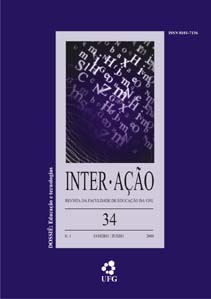PENSAMIENTO Y POLITICA UNIVERSITARIA EN AMERICA LATINA
DOI:
https://doi.org/10.5216/ia.v34i1.6565Resumen
Mientras muchos académicos y directivos, de diferentes países y organizaciones internacionales, enfocan la problemática universitaria en oposición a las condiciones del orden neoliberal predominante –aunque con matices que varían entre lo radical, lo ambiguo y lo ingenuo– otros abogan por la irremediable aplicación de medidas en adaptación al status quo. Este trabajo es un intento de resumir lo expresado anteriormente sobre la base fundamental de una investigación documental –destacando opiniones de algunos colegas expertos– así como también de las experiencias del autor en intercambios con estudiantes, profesores y directivos de la educación superior de diferentes países de la región. Además, las propias concepciones del autor sobre educación, estado e ideología en América Latina constituyen las categorías fundamentales de su crítica.Descargas
Descargas
Publicado
Cómo citar
Número
Sección
Licencia
A Inter-Ação utiliza como base para transferência de direitos a licença Creative Commons Attribution 4.0 para periódicos de acesso aberto (Open Archives Iniciative - OAI). Por acesso aberto entende-se a disponibilização gratuita na Internet, para que os usuários possam ler, baixar, copiar, distribuir, imprimir, pesquisar ou referenciar o texto integral dos documentos, processá-los para indexação, utilizá-los como dados de entrada de programas para softwares, ou usá-los para qualquer outro propósito legal, sem barreira financeira, legal ou técnica.
Autores que publicam neste periódico concordam com os seguintes termos:
1) Autores mantém os direitos autorais e concedem à revista o direito de primeira publicação, com o trabalho simultaneamente licenciado sob a Licença Creative Commons Attribution que permite o compartilhamento do trabalho com reconhecimento da autoria e publicação inicial nesta revista.
2) Autores têm autorização para assumir contratos adicionais separadamente, para distribuição não-exclusiva da versão do trabalho publicada nesta revista (ex.: publicar em repositório institucional ou como capítulo de livro), com reconhecimento de autoria e publicação inicial nesta revista.
3) Autores têm permissão e são estimulados a publicar e distribuir seu trabalho online (ex.: em repositórios institucionais ou na sua página pessoal) a qualquer ponto antes ou durante o processo editorial, já que isso pode gerar alterações produtivas, bem como aumentar o impacto e a citação do trabalho publicado.















